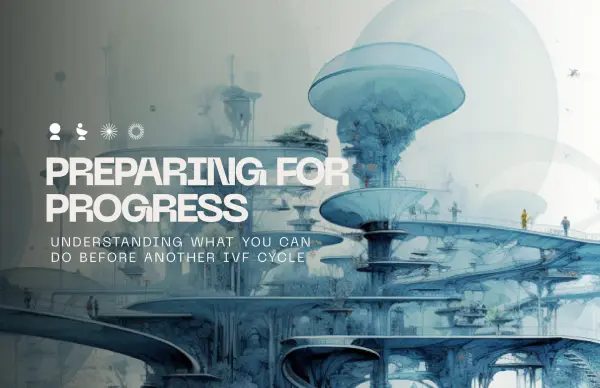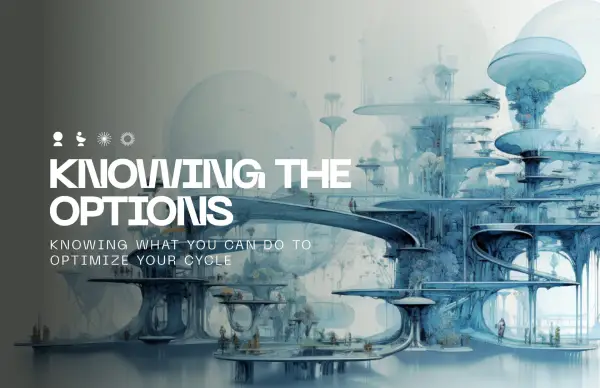Blog
Failed IVF attempts – Here’s how you optimize your cycle

Contents
Why does IVF fail?
Coping with IVF failure
What to avoid after a failed IVF cycle?
IVF failed, now what?
Factors for IVF success
Considerations before another IVF cycle
Alternative ways to optimize your cycle
There’s always hope
Experiencing failed IVF is a deeply emotional experience. Sadly, many individuals face this heartache on their path to parenthood. There are many reasons it occurs.
It’s normal to feel disappointed and grief-stricken. However, there’s still hope to conceive once you’ve healed. Sometimes it takes multiple cycles for IVF success.
Keep reading to learn more about how to optimize your cycle. Below, we uncover possible reasons the process fails. We highlight how to cope during the difficult times.
Why does IVF fail?
IVF gives many women hope of conception. Many believe that their chances of falling pregnant are high. Unfortunately, the live birth rate from the treatment is around 40%.
These numbers are calculated based on women aged 35 and younger. Sometimes infertility is unexplained. Let’s clarify some reasons for the high IVF failure rate.
Egg issues
During the laboratory part of the IVF process, the eggs and sperm are combined. They may appear healthy, but sometimes there is an invisible defect.
The result in this case is failure to implant when placed in the uterus. Some labs reduce the risk by grading the embryo quality. In these cases, technology, like an embryo scope, helps assess if the egg is viable.
As women age, there are improper chromosomes. After the age of 35, the chances of an abnormality increase. It could be a numerical abnormality (aneuploidy) or a structural one.
In the former, there may be an extra or a missing chromosome. The latter refers to a duplication, translocation, or deletion of parts. Doing preimplantation genetic screening before transferring eggs back to the uterus reduces the risk.
Certain IV treatments may help improve their quality.
Sperm abnormalities
The embryo is the reason for failed IVF. In rare cases, the issue may stem from the sperm. Before the process commences, experts first analyze the semen.
The aim is to ensure that only the healthiest sperm is used. These tests look at their density, motility, and morphology.
There is a minimum sperm count required for the treatment. Most facilities require 20% to have normal morphology. They need 15% to be progressively motile, and 30% to have motility.
Poor ovarian response
Part of the IVF treatment requires the female to take a daily injection. This typically occurs in the early stages of the process.
The syringe contains a fertility hormone called follicle-stimulating hormone (FSH). The body’s response to the injection is an increase in egg production.
Women’s ovaries don’t always respond as expected. When this happens, the body cannot produce multiple eggs.
Doctors often try to remedy this situation with medications. The female needs to undergo tests to assess the ovarian reserve.
Implantation problems
If the embryo doesn’t implant when transferred to the uterus. There are various reasons this could happen. There could be issues such as:
- Fibroids: Non-cancerous growths made of fibrous tissue and muscle. These make it difficult for the embryo to implant. Fibroids may block the fallopian tubes.
- Polyps: These form from the overgrown lining of the uterus. They may or may not be cancerous. These growths play a major role in infertility and miscarriages. Polyps can also block the canal of the cervix.
- Thin endometrial lining: In some instances, the uterine lining is thinner than usual. When the tissue isn’t thick enough, implantation can’t occur. A thin lining cannot sustain an embryo.
Lab factors
IVF is a sensitive process. The labs where the procedure occurs are controlled environments. Factors like pH levels, oxygen availability, and carbon dioxide levels all play a role. Any fluctuations can cause harm to the embryo before implantation.
Endometrial receptivity
There needs to be proper synchronization between the embryo and the uterine lining. Timing is key. The endometrial receptivity window plays a major role in the success of implantation.
Polycystic ovary syndrome (PCOS)
The condition affects how a woman’s ovaries function. It’s characterized by irregular cycles, excess androgens, and polycystic ovaries. Individuals with this condition may experience hormone imbalance and irregular ovulation.
When taking IVF medication, women with PCOS are susceptible to developing ovarian hyperstimulation syndrome (OHSS). The result is an exaggerated response to the hormone medication. The ovaries then swell and are painful.
Women with PCOS who attempt IVF are 60% likely to fall pregnant and experience a live birth.
Coping with IVF failure
The IVF procedure can be taxing. It’s an emotional time filled with hope. The process is quite costly. Discovering that you’ve had a failed attempt may feel devastating.
Fortunately, it doesn’t mean that all hope is lost. Acknowledge your feelings of loss. Take the time you need to grieve. It’s the time to practice self-care and rely on any support structure you have available.
Some individuals seek naturopathic medicine on their healing journey. You feel ready. There are steps you can take to fall pregnant again.
What to avoid after a failed IVF cycle
There are certain things to avoid after a failed IVF attempt. A list of what not to do includes:
- Avoid blame games: It doesn’t undo what happened. You don’t feel any better when you do it.
- Don’t rush: Take this time to heal and grieve.
- Don’t lose hope: IVF sometimes takes several cycles to be successful.
- Avoid trying every online hack to fall pregnant. Not all internet advice is safe.
IVF failed, now what?
Once you’ve recovered from your failed IVF attempt, you may feel ready to go through the process again. Schedule a follow-up consultation with your doctor. Discuss any concerns and raise questions.
Getting clarity is essential so you can move forward confidently. Inquire if there are any medications or protocols that you should do differently. Perhaps certain changes boost your chances of success.
Many women are unsure of what to do after failed IVF. It’s important to maintain a healthy lifestyle and get emotional support. When you’re ready to try again, your doctor may suggest options for boosting your egg quality.
It’s crucial to have a stable blood circulation. Staying hydrated helps with this. After consulting with your doctor, you may feel like going through another round of IVF.
Some individuals prefer to look at other alternatives after an unsuccessful attempt. Popular options include a third-party donor or surrogacy. There are alternative therapies that may enhance the cycle.
Factors for IVF success
IVF is a complicated and delicate process. Many variables contribute to its success or failure. There are certain things you can do to enhance your chances of the former.
When planning for IVF, doctors advise you to prepare three months in advance. It involves improving your lifestyle. A healthier body has a higher chance of conception.
The first aspect to tweak is your eating habits. Aim for a nutrient-filled diet, packed with plenty of vitamins and minerals. Consuming the correct foods nourishes the womb and slows egg degeneration.
Options like leafy vegetables, whole grains, pulses, fruits, and fish are ideal. Aim to keep your body weight within a healthy BMI range.
Limit caffeine to a maximum of two cups a day and avoid smoking or consuming alcohol. Keep active with moderate activities like walking or yoga.
It’s essential to get enough rest so your metabolic processes can function optimally. Get 7–8 hours of sleep nightly. Avoid eating close to bedtime. Consume your last meal at least three hours before your planned slumber.
There are certain supplements to help boost your fertility. Most doctors recommend folic acid. It promotes embryonic health. Take it three months before treatment and throughout your pregnancy.
Another beneficial supplement is vitamin D. It’s best to take this under your doctor’s supervision. It could also counteract fertility medication.
Considerations before another IVF cycle
Like with most medical procedures, there are certain risks involved with IVF. Be sure to understand them before deciding to do another cycle of the treatment. Some of these include:
- Stress: In today’s busy lifestyle, the treatment may feel like another draining factor. The cost, mental strain, and physical aspects might get overwhelming. Relying on the support of loved ones can help you overcome this risk.
- Complications from egg retrieval: Your doctor collects the eggs from the ovaries. They use a long, thin needle. It’s guided by ultrasound images. There’s a risk of this needle causing bleeding or infections. It could also cause damage to the bladder, bowel, or blood vessels.
- Miscarriage: When conceiving using IVF, there is a risk of losing the fetus. The level is around 15% for women in their 20s and it rises with age. A female in her 40s has a 50% risk of miscarriage.
- Ectopic pregnancy: The fertilized egg doesn’t attach to the correct tissue. It attaches outside the uterus, typically in a fallopian tube. The embryo can’t survive here and doctors recommend terminating the pregnancy.
- Birth defects: This risk is not specific to IVF conception. Babies born from this treatment often have heart or digestive issues. The age of the mother is the primary risk factor.
- Multiple pregnancy: You may fall pregnant with more than one baby with IVF. Multiple pregnancies come with a variety of risks for the mother. These include high blood pressure, diabetes, and premature labor. The baby may have a low birth weight.
Alternative ways to optimize your cycle
Certain treatments help optimize your cycle. So, when you go through an IVF cycle, you’re in optimal condition.
One of these remedies is glutathione. It has antioxidant properties which assist with detoxifying the system. Studies suggest that increasing the glutathione in the body results in improved embryo and sperm quality.
There are several reasons your body may lack this antioxidant. Reasons include:
- Poor diet
- Stress
- Trauma
- Environmental toxins
- Age
Glutathione is best absorbed through injections. Taking a dose once or twice a week is ideal.
Vitamin C supplements reportedly assist with fertility. It helps regulate the menstrual cycle and promotes iron absorption. It has antioxidant properties and is best paired with other beneficial supplements.
Next on the list of treatments is nicotinamide adenine dinucleotide (NAD+). It’s a coenzyme that plays a vital role in the cell nuclear energy production of mitochondria.
It plays a role in DNA repair. Research suggests that replenishing NAD+ may boost female fertility. Here at LIVV Natural, we offer an IV of this incredible coenzyme.
Methyl folate may offer a variety of benefits for fertility. These include improving egg quality, boosting sperm health, and regulating ovulation.
Coenzyme Q10 (CoQ10) occurs naturally in our bodies. It helps convert food into energy. Anecdotal data suggests that receiving a treatment of CoQ10 for 60 days or longer improved egg health and fertilization rates.
The last fertility booster worth mentioning here is vitamin B12. Research suggests that when combined with folate supplements, it’s effective.
With so many alternative options for optimizing your cycle, it may seem overwhelming to structure a treatment. One way to make the most of all the options is with a regulated dose of each.
The following combination may be effective:
- 20 grams of vitamin C
- 2 grams of glutathione
- 400 mg of NAD+
- A recommended dose of methyl bags
- Vitamin D
- CoQ10
- Vitamin B12
Speak to your doctor about using these alternative remedies to increase your chances of successful IVF.
There’s always hope
Failed IVF treatment can feel disheartening. Fortunately, having one failed cycle isn’t the end of the road. You can try another cycle and try to do certain things differently.
Some individuals find taking supplements to improve their embryo quality yields success. Others make lifestyle changes to get healthier.
Alternative therapies to balance hormones may do the trick. Why not book an NAD+ session at LIVV Natural and boost your well-being?
Author: Dr. Jason Phan NMD – Founder of LIVV Natural – Anti-aging – regenerative medicine – peptide therapy


